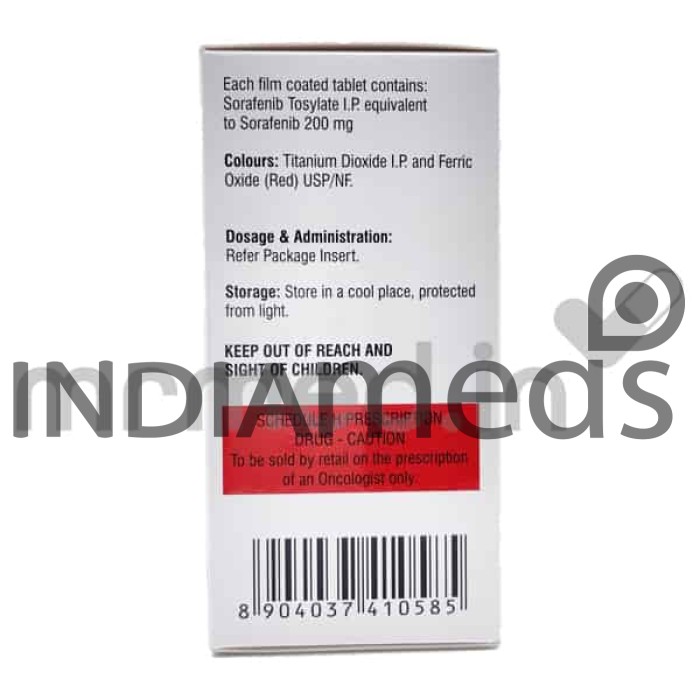Sorafenat 200mg Tablet belongs to the group of medicines called anti-cancer. It consists of the active ingredient Sorafenib which is indicated for advanced renal cell carcinoma (kidney cancer), advanced hepatocellular carcinoma (liver cancer) in patients ineligible for surgery, and differentiated thyroid carcinoma (thyroid cancer) in patients who are not responsive to radioactive iodine therapy.
Diarrhea, tiredness, stomach pain, nausea, weakness, rashes, flu-like illness, appetite loss, nausea, weight loss, and low blood calcium levels are common side effects of Sorafenat 200mg Tablet. Inform your doctor if any of these side effects disturb or persist with you.
Inform your doctor if you are allergic to this Tablet and its ingredients. Before starting treatment with this tablet, you should tell your physician if you have heart problems, chest pain, bleeding problems, high blood pressure, or have had or are about to have surgery. Use effective contraception during the therapy and for 6 months after the last dose if you are a woman or 3 months after the last dose if you are a man.
- Advanced renal cell carcinoma
- Advanced hepatocellular carcinoma that cannot be surgically treated
- Advanced papillary and follicular Hurtle cell thyroid carcinoma
Therapeutic Effects of Sorafenat 200mg Tablet 120's
Pregnancy
It is unsafe to use Sorafenat 200mg Tablet during pregnancy as it may harm the unborn baby. Inform your physician before starting this treatment if you are pregnant or think you might be pregnant. Your physician will conduct a pregnancy test before prescribing this medicine.
Breast Feeding
Do not breastfeed during treatment with Sorafenat 200mg Tablet and for two weeks after the last dose. It is vital to let your physician know if you are breastfeeding or planning to breastfeed before starting treatment with this drug.
Lungs
Sorafenat 200 mg tablet should be cautiously administered in patients with certain lung problems. Consult your doctor if you have any lung disorders.
Liver
Sorafenat 200 mg tablet should be taken with caution in patients with severe liver disease. Consult your doctor for advice.
Alcohol
Avoid drinking alcohol while taking Sorafenat 200mg Tablet as it can cause unpleasant side effects like drowsiness, dizziness, or difficulty in concentrating.
Driving
This medicine could cause peripheral sensory neuropathy that causes an impact on driving. Hence, avoid driving or doing things that require focus during this treatment period.
Serious:
- Stevens Johnsons Syndrome and toxic epidermal necrosis
- Decreased blood flow to the heart
- Increased risk of bleeding (blood in urine, stool, vomit, cough, etc.)
- High BP
- Skin problems
- Liver problems
- Problems in wound healing
Common:
- Nausea, stomach pain, diarrhea
- Tiredness and weakness
- Infection
- Hair thinning and patchy hair loss
- Rash
- Weight loss
- Loss of appetite
- Low levels of calcium in the blood
- Flu-like illness
Yes, Sorafenat 200mg Tablet is safe to be taken by diabetic individuals. However, only take it after seeing a doctor, as they may change the dose based on the patient's condition.
Sorafenat 200mg Tablet is not recommended for people who are allergic to any of its ingredients, have squamous cell lung cancer, or are already taking carboplatin and paclitaxel.
Sorafenat 200mg Tablet should be discontinued if a person experiences a major adverse effect that impairs their quality of life. If not, you must continue taking this medication until your physician instructs you to stop.
Sorafenat 200mg Tablet belongs to the group of medicines called anti-tumor and tyrosine kinase inhibitors.
Sorafenat 200mg Tablet should not be taken during pregnancy as it may harm the unborn baby. It is better to use effective contraceptive methods to prevent pregnancy while taking this medicine or for at least six months after taking the final dose.
Molecule name: Sorafenib | Therapeutic class: Tyrosine kinase inhibitor |
Pharmacological class: Anti-Neoplastics | Indications: 1. Advanced renal cell carcinoma 2. Advanced hepatocellular carcinoma that cannot be surgically treated 3. Advanced papillary and follicular Hurtle cell thyroid carcinoma |





